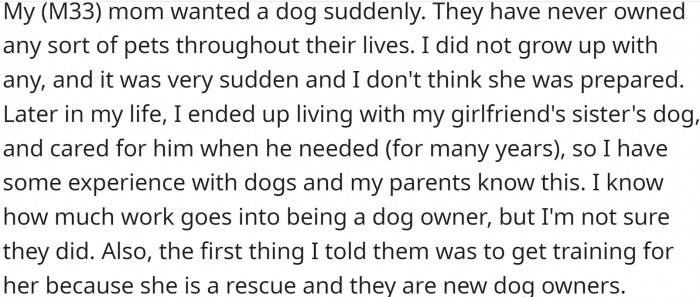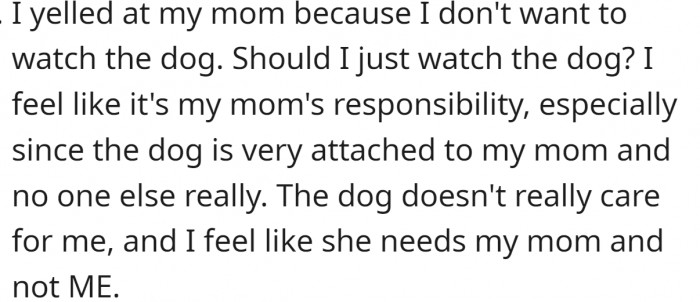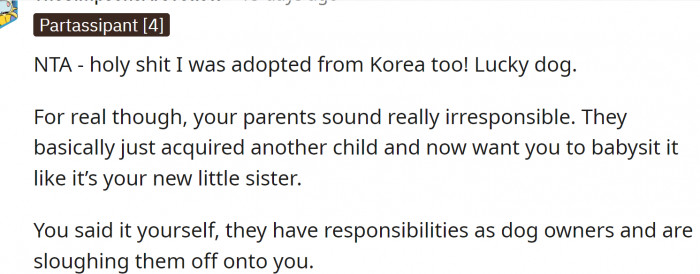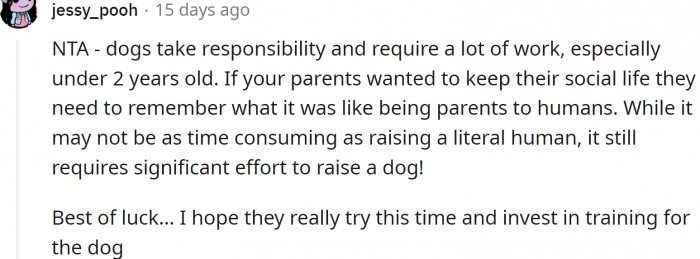Redditor Angry At His Parents For Taking Back The Dog They Rehomed A Couple of Days Earlier
Some people adopt pets without considering whether they have the time, money, and ability to care for them properly. This is a bad idea, as pets need attention and care, and if you cannot provide them with the necessary care, then it's unfair to the pet.
Taking on a pet is a significant responsibility and should not be done lightly. It's important to research the type of pet you are interested in and ensure you have the necessary resources to provide for it.
OP (M33) was surprised when his parents suddenly adopted a 1.5-year-old toy poodle (F) from Korea, as they had never owned any sort of pet before. Having cared for his girlfriend's sister's dog for many years, OP had a basic understanding of how much work goes into being a dog owner and had warned his parents to get training for their new pet.
When they asked him to check on the dog and take her for a walk, let her out to relieve herself, and feed her once a week, OP was okay with it. However, at Christmas, his parents began having second thoughts about dog ownership and expressed that to their family.
Despite OP's anger, he did not talk back to his parents due to their culture's respect for elders. The dog was rehomed, but a few days later, his mom called him, crying and wanting to take the dog back.
The family was nice enough to give her back, and after OP scolded his mom for not taking dog ownership seriously, she asked him to watch her the next day as they had tickets to a symphony concert. OP refused and now feels guilty for putting his foot down.
Read the full story below:
OP asks:

His parents adopted a dog

OP (M33) was surprised when his parents suddenly adopted a 1.5-year-old toy poodle (F) from Korea, as they had never owned any sort of pet before.

The Emotional Impact of Rehoming Pets
Dr. Julie K. Smith, an animal behaviorist, emphasizes that pets are often considered family members, and their removal can lead to significant emotional distress. Her research indicates that the emotional bonds formed with pets are akin to those with human family members, and losing that bond can trigger feelings of grief and loss. The Redditor's anger toward his parents for rehoming the dog reflects a natural response to perceived betrayal and loss.
This emotional turmoil can be exacerbated by the sudden nature of the rehoming, which can feel like a rejection of the relationship formed with the pet.
The Emotional Bond Between Pets and Families
The bond between pets and their owners often serves as a vital source of emotional support and companionship. Research in animal-assisted therapy has demonstrated significant psychological benefits associated with pet ownership, including reduced stress and enhanced emotional well-being. When families face the prospect of rehoming a pet, it can trigger complex emotional responses related to attachment and loss.
According to Dr. Sue Johnson, a couples therapy pioneer, “Pets are often seen as family members, and their loss can lead to profound feelings of grief and anxiety.” The sudden decision to reclaim a pet can exacerbate these feelings, particularly when the pet has already formed new attachments in its temporary home. Dr. Johnson emphasizes that “the emotional turmoil surrounding pet rehoming can mirror that of human relationships, highlighting the deep connections we form with our animal companions.”
They would call him once a week to pet sit

However, at Christmas, his parents started having second thoughts about dog ownership and expressed that to their family.

The dog was rehomed, but a few days later, his mom called him, crying and wanting to take the dog back.

Studies published in the *Journal of Applied Animal Welfare Science* indicate that rehoming pets can lead to behavioral changes in both the animals and the owners. For the Redditor, the return of the dog after only a few days might not only highlight the emotional bond he had formed but also suggest the need for clearer communication regarding expectations for pet care within the family.
The decision to rehome the dog just days earlier may indicate underlying issues related to conflict resolution and commitment within the family. Psychological research suggests that impulsive decisions often arise in high-stress situations, particularly when emotions run high. Understanding the motivations behind these decisions can help families navigate complex emotional landscapes and develop healthier coping strategies.
It's essential to recognize that rehoming pets should be approached with sensitivity, as it can have lasting impacts on both the animal and the family involved. Taking time to reflect on the emotional implications of such decisions can lead to more thoughtful outcomes.
Now they got the dog back, and want OP to pet sit again

OP was furious

He believes he might have gone too far

Navigating Family Dynamics
Family dynamics play a crucial role in how decisions are made regarding pets. Dr. David M. A. Mendez, an expert in family psychology, suggests that decisions made in haste can lead to regret and conflict within family systems. The Redditor's situation underscores the importance of discussing and planning family responsibilities regarding pet ownership to avoid misunderstandings and emotional fallout.
Open dialogues about pet care responsibilities can help prevent similar conflicts in the future, fostering a sense of collective responsibility and unity.
Navigating Family Dynamics and Responsibilities
Family dynamics can often influence decisions regarding pet ownership, leading to conflicts about responsibility and attachment. Research in family psychology shows that shared responsibilities for pets can enhance family cohesion, but when disagreements arise—such as about rehoming—it can create significant tensions. Acknowledging each family member's perspective is crucial for resolving such conflicts.
According to studies, involving all family members in discussions about pet care and responsibilities can promote collaboration and understanding, ultimately leading to better outcomes for both the family and the pet. This collaborative approach fosters a sense of shared ownership and accountability.
And asks:

OP has offered the following explanation for why they think they might be the a-hole:

And this:

To address the emotional fallout and prevent future misunderstandings, the Redditor might consider initiating a family discussion about pet care expectations. This proactive approach can clarify responsibilities while also reinforcing the emotional bonds shared within the family, emphasizing that pets are a shared responsibility.
Practically, establishing clear agreements about pet care responsibilities can help mitigate misunderstandings and conflicts. Families can benefit from having regular family meetings to discuss pet care and responsibilities openly. Creating a shared family document that outlines each member's responsibilities can also enhance accountability and ensure that everyone is on the same page.
Additionally, considering family therapy can provide a safe space to address underlying issues and improve communication regarding shared responsibilities. A neutral party can help facilitate discussions, allowing families to explore their feelings and concerns without judgment.
The first comment said it all:

They adopted a dog. OP did not.

The parents sound really irresponsible. They basically just got another child and want the first child to babysit.

Building Empathy and Understanding
Dr. Brené Brown highlights the significance of empathy in resolving conflicts within families. Her research emphasizes that understanding each other's perspectives can lead to healthier interactions and stronger relationships. The Redditor's anger could be reframed as an opportunity for family members to express their feelings about the rehoming and to foster deeper connections.
By practicing empathy, family members can work toward mutual understanding, allowing for more constructive discussions about future pet ownership.
Mom is trying to guilt trip OP

"Dogs take responsibility and require a lot of work."

Animals form strong bonds with their owners, and when they are taken away and returned, it can be confusing and stressful. This can cause the animal to develop anxiety and behavioral issues or even lead to them not trusting their owners and having difficulty forming relationships with people.
It is essential to think carefully before adopting an animal and consider the long-term commitment that comes with it.
Psychological Analysis
This situation illustrates the intricate emotional dynamics involved in pet ownership and family relationships. The tension surrounding the rehoming of the dog reflects deeper issues related to attachment, responsibility, and communication within the family. Recognizing the emotional significance of pets can help families navigate these challenges with empathy and understanding.
Analysis generated by AI
Analysis & Alternative Approaches
Understanding the emotional complexities surrounding pet ownership is essential for fostering healthy family dynamics. Clinical psychologists emphasize the importance of open communication and shared responsibilities in navigating conflicts related to pets. By addressing these issues collaboratively, families can strengthen their bonds and enhance emotional well-being for all members.
Incorporating family activities that include the pet can also strengthen bonds and reinforce the importance of shared responsibilities. Engaging in training sessions or outings can not only enhance the pet's behavior but also promote family unity, emphasizing that caring for a pet requires collective effort.
The Role of Guilt and Responsibility
Feelings of guilt often accompany decisions made about pet care, particularly when rehoming occurs. Dr. John Bowlby’s attachment theory suggests that the bonds formed with animals can lead to emotional distress when those attachments are severed. Understanding these feelings is crucial for the Redditor and his family as they navigate their responsibilities.
Allowing space for these emotions can facilitate healing and understanding within the family, ultimately leading to more informed decisions regarding pet care in the future.
Analysis & Alternative Approaches
In summary, the Redditor's anger regarding the rehoming of his dog reflects common emotional responses tied to the human-animal bond. Research indicates that understanding family dynamics and fostering open communication can alleviate feelings of loss and resentment. Experts such as Dr. Julie K. Smith and Dr. David M. A. Mendez highlight the importance of empathy and shared responsibility in navigating family relationships, particularly concerning pet care.



